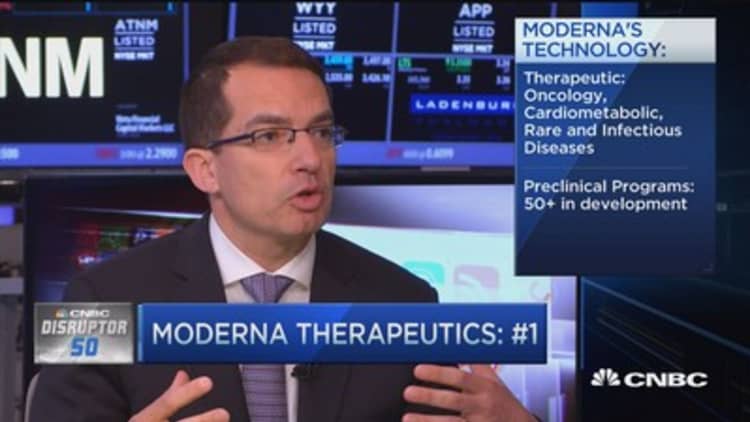
In January, a four-year-old company with fewer than 200 employees announced the largest private round of fundraising for any biotechnology company in history: half a billion dollars in one fell swoop.
The funding added to another half billion already in the young drugmaker's coffers, complementing its series of deals with pharmaceutical giants AstraZeneca, Merck and Alexion. Even more remarkable: The technology is not even being tested in humans yet.
The company—founded by Flagship Ventures in 2011 by a team of scientific advisors from Harvard University and MIT— is Cambridge, Massachusetts-based Moderna Therapeutics. It's working on what one biotech analyst called the Holy Grail in drug development—if it works. Moderna is focused on treating disease by delivering messenger RNA, or mRNA: the molecules that act as instructions for our cells to create proteins.
Read MoreMeet the companies on the 2015 CNBC Disruptor 50
"Because mRNA is nothing more than a copy of DNA, you could potentially make any protein you want, because the code is there," said Noubar Afeyan, chief executive at Flagship Ventures and co-founder of Moderna, in an interview in Flagship's Cambridge offices. He's also chairman of Moderna, whose name, he said, comes from "modern RNA."
Moderna's approach is both simple and audacious: simple in that it taps into the most foundational way our bodies work, aiming to deliver instruction manuals for our cells to churn out proteins to reverse all kinds of diseases—from diabetes and heart disease to different forms of cancer. It's audacious because it's never worked in humans.
Moderna now has 56 programs in preclinical testing; 29 are partnered with AstraZeneca and focused on cardiovascular disease and cancer, seven are being developed in collaboration with Alexion for rare diseases, and five are partnered with Merck on viral diseases. The company plans to start human trials of its first program, which it hasn't disclosed, in the next 12 to 18 months.
"The opportunity is just huge," said Eric Schmidt, a biotechnology analyst at Cowen who covers Moderna's partner Alexion. "There are so many things you can do if you very simply create cells that produce proteins from messenger RNA in the body."
The potential market size for Moderna is difficult to quantify, given the scope of what it's addressing. The top-selling drug in the world last year was AbbVie's Humira, for rheumatoid arthritis, in a class called monoclonal antibodies. Humira alone drew about $12 billion in 2014. Some have bet the market for drugs targeting RNA can surpass that of the dozens of monoclonal antibodies already on the market. (Tweet this)
Read MoreWhy this hot market is suddenly cooling off
Understanding what Moderna's working on requires a little bit of a science lesson. The central dogma of molecular biology, which governs the way our bodies function, tells us that: DNA contains genetic information which is then transcribed into instructions carried by messenger RNA to cells, that then churn out proteins.
Drug development has typically focused on the end of that process, targeting the proteins associated with disease. Work is also being done targeting DNA, trying to deliver healthy copies of genes to cells.
"In between those two is this giant gaping hole in terms of drugs, which is RNA," Afeyan said.
That's changed in the last few decades, as companies from Isis Pharmaceuticals to Alnylam Pharmaceuticals have made progress targeting RNA—and amassed market values of more than $16 billion combined. But their technologies, Afeyan explained, focus on blocking RNA's ability to code for problematic proteins, whereas Moderna, through delivering messenger RNA, aims to enable the body to make any protein imaginable.
Read MoreGoogle is even more influential than you think
The problem, Afeyan said, has been that the body sees foreign mRNA as dangerous. So when it's been delivered to cells, the body mounts an immune attack, similar to how it would react to a virus.
"People had tried [delivering mRNA for therapeutics uses] and failed, and they basically abandoned it 25, 30 years ago," Afeyan said.
Body, heal thyself
The key was figuring out how to deliver mRNA in stealth mode: enabling it to evade the body's surveillance system and be accepted as something natural. Moderna, Afeyan said, has figured that out.
"Initially, I did not believe the data," said Stéphane Bancel, now Moderna's CEO. "When he started to explain the technology, I said that's impossible; mRNA will never be a drug."
Bancel at the time was running bioMerieux, a French diagnostics company with 6,000 employees and a market value of more than $3 billion. A student of business history, Bancel said he saw the potential of mRNA following the same S-shaped curve that characterizes the path of any new breakthrough.
Read MoreBiotech's torrid run may not be over, analysts say
"I said, 'Wow, this is going to be like any new technology. We can get 100 times, 1,000 times improvement," Bancel said. "And if we can do that, then we can make drugs today that we cannot make with where the technology is."
It was a big bet, leaving a "nice, comfy job" to head a start-up in an area of medicine that's never worked before, Bancel said.
"One reason I took the plunge is, I said if this is going to work and it is going to end up being the next big thing, I'd hate myself every morning shaving in the mirror [if I'd passed it up]," he said.
Continuous reinvention
The science is moving at such a fast rate, Bancel explained, noting that "there are days where we've reorganized the entire company. We learn something at night with an experiment, something that works great or did not work that was very profound, and instead of talking about this for months, we get the executive team in a room" and make a decision the next day. Moderna, he said, has been completely reorganized "two, maybe three times," since it was founded in 2011.
Moderna's also created unique groups under its umbrella that it calls venture companies, focused on developing treatments in specific therapeutic areas: Onkaido Therapeutics for cancer, and Valera for infectious diseases. Today it announced a third: Elpidera, for rare diseases. (The name is derived from the Greek word—elpida—for hope, the company said.) Elpidera will work on programs independent from those partnered with Alexion, while also "supporting Alexion in its efforts to leverage the Moderna technology," the company said.
Read More50 highfliers that investors should know about
"We're very excited about our collaboration," Alexion CEO David Hallal said in an interview. "Literally five quarters from the initiation of the collaboration, we already have seven rare disease preclinical programs we've identified, and we're committed with Moderna to move the first into the clinic in 2016. We're very excited about this as a platform technology."
Bancel said the technology has advanced so much and Moderna has raised so much cash that "the things that keep me awake at night" are finding the best talent and moving at the right pace.
"If you want to the best company in the field, as the technology guys have shown us time after time, you have to be the first guys and you have to move very fast," Bancel said. "But at the same time, you don't want to move too fast. The pace is kind of crazy."
But there is still a long way to go and a lot to prove—trials in humans take years, and the biotech world is notoriously fickle. And so far, Moderna has been secretive about its plans. For example, it has not disclosed the therapeutic area of its most advanced compound. According to Bancel, that's because it doesn't want to be painted as a company focused on just one area, but rather as one delivering a new platform capable of addressing a myriad of diseases.
"There's been very little data that's been out there," said Kleanthis Xanthopoulos, CEO of another RNA-focused drugmaker, Regulus Therapeutics. "But clearly they must have something going for them, because people are throwing money left and right. They're doing something obviously very good."





